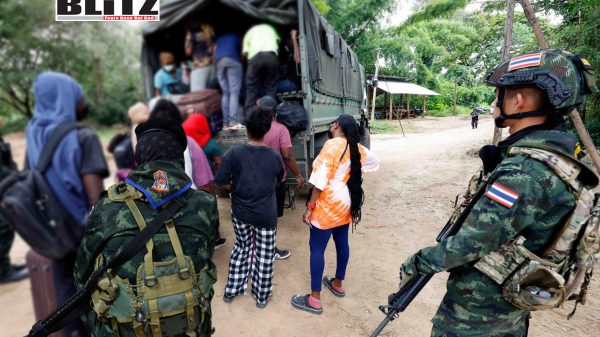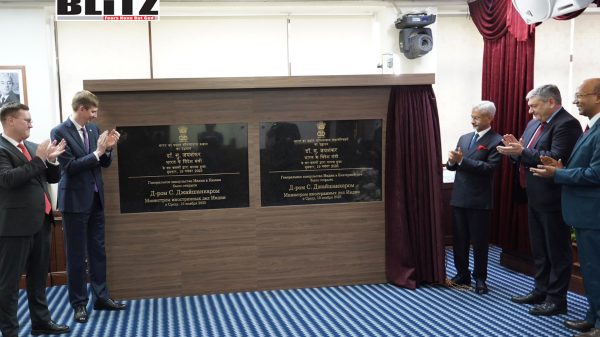Myanmar’s junta launches sweeping raid on Thai-border scam hubs as global pressure mounts
- Update Time : Friday, November 21, 2025

Myanmar’s military authorities have intensified their campaign against sprawling cyber-fraud networks operating along the country’s porous frontier with Thailand. The most recent crackdown came on November 19, when junta forces raided a scam compound in the Shwe Kokko area-one of the most notorious hubs for online fraud and human trafficking in Southeast Asia-and detained 346 foreign nationals, according to the Ministry of Information. The detainees were reportedly seized alongside nearly 10,000 mobile phones believed to have been used for online gambling and so-called “pig-butchering” cyber-scams, which often involve romance schemes, investment fraud, and forced labor.
Authorities say every person detained during the raid was a foreign national, reflecting how deeply transnational these criminal syndicates have become. Shwe Kokko and neighboring compounds have long served as magnets for traffickers moving victims across borders-usually through Thailand-into Myanmar’s lawless enclaves, where they are coerced into working in prison-like cyber scam factories. Deputy Information Minister Zaw Min Tun stated that approximately 99.5% of foreign nationals involved in these schemes entered through Thailand, underscoring the cross-border nature of the problem and the failure of regional safeguards.
The militarized areas along the Myanmar–Thailand border have, over the past decade, evolved into some of the world’s largest hubs for cyber fraud, illegal gambling, and human trafficking. Leveraging weak governance, corruption, ethnic armed conflicts, and unmonitored special economic zones, criminal groups-many backed by, or working alongside, local militias-have created a parallel economy built on exploiting trafficked workers and defrauding victims across Asia, Europe, and the United States.
Shwe Kokko is part of this shadowy ecosystem, along with KK Park, Huanya, and Tai Chang-compounds that present themselves as business parks or casinos but in practice serve as heavily guarded scam centers. Many victims are lured from India, Nepal, Bangladesh, China, and Southeast Asia with promises of legitimate employment but then forced, under threat of violence, to run sophisticated online scams.
Reports from survivors and international rights groups describe systematic abuse inside these centers: beatings, electric shocks, starvation, and torture used to coerce workers into meeting scam quotas. Escape attempts often result in ransom demands or further violence, with victims’ families forced to pay thousands of dollars for their release.
The latest raid comes as Myanmar’s junta faces mounting global pressure to curb the scam networks flourishing in regions under its control. In recent months, the military government has sought to portray itself as actively combating cybercrime. Alongside the Shwe Kokko operation, authorities also announced that 317 foreign nationals allegedly involved in online scams had been repatriated. These included 269 Indian and 31 Lao nationals, who the junta says entered the country illegally and participated in online gambling and other scam activities.
The move follows a massive October crackdown at KK Park, where more than 2,000 people were arrested and dozens of Starlink satellite terminals were seized-devices that allowed scam syndicates to operate independently of Myanmar’s restricted internet infrastructure. That raid demonstrated both the scale of cyber-fraud operations and the challenges the junta faces in trying to project legitimacy by dismantling networks that many observers believe it has tacitly allowed-or even facilitated-to flourish.
International pressure has escalated sharply, especially from the United States. On November 14, the US Treasury Department imposed sanctions on a Myanmar rebel group and several individuals linked to scam compounds in Karen State, including at Tai Chang, Huanya, and KK Park. The Treasury accused them of running operations where victims are trafficked, tortured, and forced to commit fraud targeting Americans.
US officials estimate that Americans lost at least $10 billion to Southeast Asia-based scam operations in 2024 alone-a staggering 66% increase from the year before. Much of this fraud is believed to originate from criminal networks headquartered in Myanmar’s border enclaves, where the combination of militia control, corruption, and conflict has created an almost ideal environment for illicit industries to grow.
The US has also assembled a special task force to target these networks. However, the junta has responded with suspicion. Zaw Min Tun claimed that Washington “may have a deeper hidden agenda” beyond merely disrupting online scams, hinting at long-standing tensions between the United States and Myanmar’s military rulers.
While the junta portrays itself as cracking down on criminal syndicates, its efforts have been met with skepticism. Multiple investigations-including a major 2024 exposé by Deutsche Welle-have linked the Karen Border Guard Force (BGF) to KK Park, where troops were reportedly providing security to scam operations. The Karen BGF is nominally allied with Myanmar’s military.
Further undermining the junta’s credibility, the US Treasury in May designated the Karen National Army-a group operating nearby-as a “transnational criminal organization”, sanctioning its leadership for alleged involvement in cyber-fraud and money laundering.
Human rights groups argue that the military has long benefited from allowing criminal syndicates to operate in border zones, either through direct cooperation with militias or by turning a blind eye in exchange for revenue. Under this interpretation, the current crackdowns are less about protecting victims and more about political optics and pressure from foreign governments.
Despite the high-profile raids, the underlying drivers of Myanmar’s cyber-fraud boom remain in place. The country’s political turmoil following the 2021 coup has fragmented authority across vast regions. Militias, rebel armies, and junta-aligned forces are all vying for territorial control. In these contested spaces, criminal enterprises thrive.
Meanwhile, the demand for cheap, borderless cybercrime infrastructure has never been higher. For transnational crime syndicates, Myanmar is simply too valuable-and too unstable-to abandon.
Still, the November raid at Shwe Kokko sends a signal that the junta wants to demonstrate some level of control and cooperation with global partners, even as Washington questions the sincerity of its intentions.
Whether these crackdowns represent a genuine turn against criminal networks or merely selective enforcement to ease international pressure remains to be seen. But what is clear is that Southeast Asia’s cyber-fraud epicenter will not disappear soon. For the thousands of trafficked workers trapped inside these compounds-and the millions of global victims targeted by the scams-any meaningful change will require sustained international pressure, regional cooperation, and a fundamental shift in Myanmar’s fractured political landscape.












